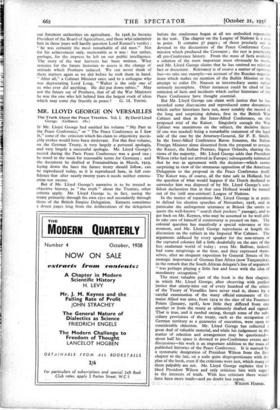MR. LLOYD GEORGE ON VERSAILLES
The Truth About the Peace Treaties. Vol. 1. By David Lloyd George. (Gollancz. r8s.) IF Mr. Lloyd George had entitled his volume " My Part in the Peace Conference," or " The Peace Conference as I Saw It," some of the criticism which his claim to objectivity inevit- ably evokes would have been irrelevant. For this first volume, on the German Treaty, is very largely a personal apologia, and very largely a successful apologia. Mr. Lloyd George's record during the Paris Peace Conference was a good one ; he stood in the main for reasonable terms for Germany ; and the document he drafted at Fontainebleau in March, 1919, laying down the lines the future treaty should follow, can be reproduced today, as it is reproduced here, in full con- fidence that after nearly twenty years it needs neither extenu- ation nor excuse.
But if Mr. Lloyd George's narrative is to be treated as objective history, as " the truth " about the Treaties, other criteria apply. Mr. Lloyd George is, in fact, seeing the treaty primarily through his own eyes and secondarily through those of the British Empire Delegation. Extracts sometimes a dozen pages long from the deliberations of the delegation
before the conference began at all are embodied repeatedly in the text. The chapter on the League of Nations is a caw in point. It contains 37 pages ; of those precisely one is devoted to the discussions of the Peace Conference Com- mission which produced the Covenant ; the rest is practically all pre-Conference history. From the mass of facts available a solution of the most important must obviously be made, and Mr. Lloyd George claims that he has omitted no relevant fact or document. Relevancy is of course a matter of opinion,
but—to take one example—an account of the Russian negotia- tions which makes no mention of the Bullitt Mission or the attempt to enlist Dr. Nansen as intermediary seems rather seriously incomplete. Other instances could be cited of the omission of facts and incidents which earlier historians of the Peace Conference have thought essential.
But Mr. Lloyd George can claim with justice that he has recorded some discussions and reproduced some documents which earlier historians have not, most notably the record of the long and surprising debates, first in the British War Cabinet and then in the Inter-Allied Conference, on the proposed trial of the Kaiser. • Singularly enough the War Cabinet was unanimous on the subject, the decisive factor (if one was needed) being a remarkable statement of the legal side of the case by the Attorney-General, Sir F. E. Smith. In the Inter-Allied Conference Baron Sonnino, the Italian Foreign Minister alone dissented from the proposal to arraign the Kaiser, the Italian Premier, Signor Orlando, sharing the views of the majority. Mr. Lloyd George adds that President Wilson (who had not arrived in Europe) subsequently intimated that he was in agreement with the decision—which seems surprising in view of the strenuous opposition of the American Delegation to the proposal in the Peace Conference itself. The Kaiser was, of course, all the time safe in Holland, but the question of what would happen if the Dutch declined to surrender him was disposed of by Mr. Lloyd George's con- fident declaration that in that case Holland would be turned out of the (still non-existent) League of Nations.
In the matter of reparations Mr. Lloyd George is at pains
to defend his election speeches of November, 1918, and in particular the unforgotten utterance at Bristol (he omits to quote the well-known " search their pockets " passage), and to get back on Mr. Keynes, who may be assumed to be well able to take care of himself if controversy is pressed on him. The colonial question has manifestly a special relevance at this moment, and Mr. Lloyd George reproduces at length the discussion on the subject in the Imperial War Cabinet. The arguments adduced by every speaker for the non-return of the captured colonies fall a little doubtfully on the ears of the less exuberant world of today ; even Mr. Balfour, indeed, had some misgivings at the time, and they expressed them- selves, after an eloquent exposition by General Smuts of the strategic importance of German East Africa (now Tanganyika), in the remark that the South African delegate's line of argument " was perhaps playing a little fast and loose with the idea of mandatory occupation."
The most valuable part of the book is the first chapter,
in which Mr. Lloyd George, after observing with perfect justice that ninety-nine out of every hundred of the critics of the Treaty of Versailles have never read it, shows by a careful examination of the many official statements of the major Allied war aims, from 1914 to the date of the Fourteen Points (January, 1918), how little they differed from one another or from the treaty as ultimately drafted and signed. That is true, and it needed saying, though some of the sub- sidiary provisions of the treaty, such as the occupation of German territory as a guarantee of execution, were open to considerable objection. Mr. Lloyd George has collected a great deal of valuable material, and while his judgement in the matter of selection and arrangement may be questioned— about half his space is devoted to pre-Conference events and discussions—his work is an important addition to the mass of published histories of the Peace Conference. It is marred by a systematic denigration of President Wilson from the fin chapter to the last, on a scale quite disproportionate with the plan of the book, even if the criticisms were just, which many c them palpably are not. Mr. Lloyd George explains that he liked President Wilson and only criticises him with regret in the interests of truth. With less criticism there would have been more truth—and no doubt less regret.
..Wn..sota HARRIS.















































 Previous page
Previous page